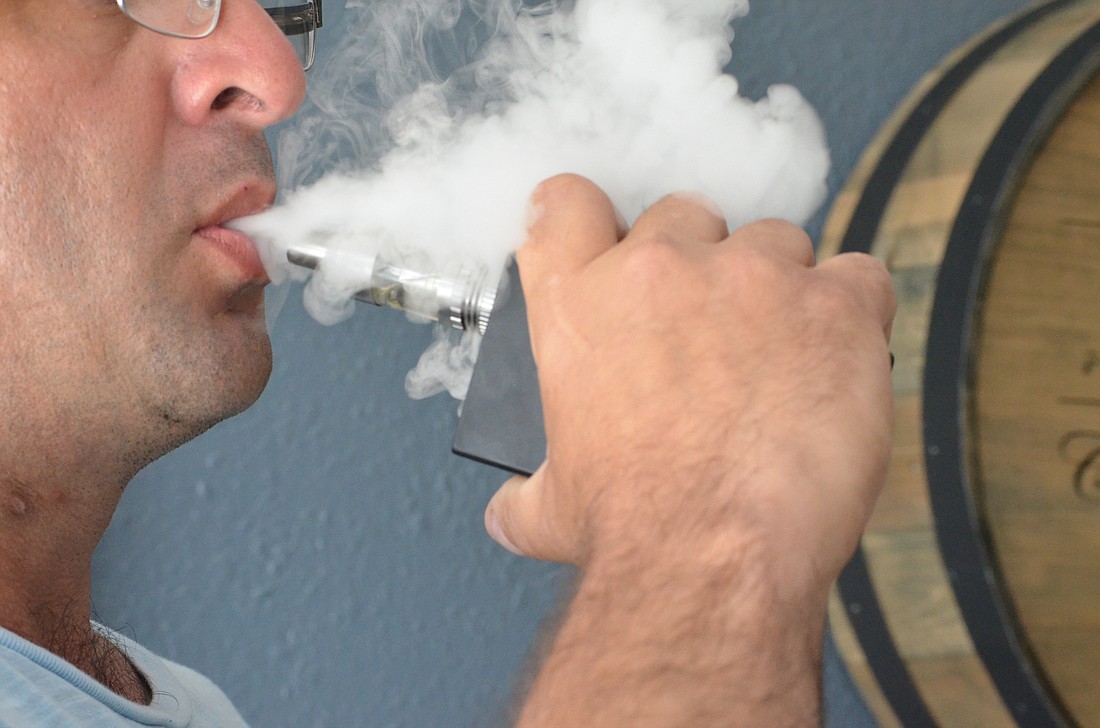- April 25, 2024
-
-
Loading

Loading

In the midst of campaigns to end cigarette use and teenagers looking to new ways for social smoking, electronic cigarettes have become a rapidly growing smoking alternative. With US sales hitting $2.75 billion in 2014 alone, according to Citi Research — nearly eight times the revenue compared to 2010 — these metallic, portable devices are projected to see another big gain by the end of 2015.
Studies by the Center for Disease Control and Georgia State University found that by the end of 2013, nearly 1 in 10 people — or about 20 million — had tried e-cigs at least once in their life.
Does that mean they’re safer? Watchdog groups aren’t so sure. The American Lung Association’s opinion on the electronic metal devices that heat nicotine-infused fluid into a vapor is that they’re an untested mystery.
“There is no way for the public health and medical community or consumers to know what chemicals are contained in e-cigarettes or what the short- and long-term health implications might be,” the Association’s official statement reads.
But a new local franchise is offering an even healthier alternative to the regular electronic cigarette, one without a chemical called propylene glycol, a component some claim may have carcinogenic properties.
Unlike regular e-cigs, which are fueled by a mixture of propylene glycol, vegetable glycerin, flavoring and optional nicotine, Palm Beach Vapors' formula for e-cig juice replaces that chemical with what founder Chris Paul said is a specialized protein, an ingredient that encapsulates the oil-based flavoring.
A year and a half ago, Diana Staples and her husband became local franchisees for Palm Beach Vapors after searching for a business close to home that they could call their own. And although they had never been smokers, the couple was motivated to jump on the undertaking after witnessing loved ones battle illness as a result of a lifetime of smoking cigarettes.
“I've seen how cigarettes can affect people in a negative way. I've never used the word passionate about any job I've ever had, but it makes me feel good,” she said.
Staples' mother-in-law was recently put in hospice care due to terminal lung cancer. The 69-year-old, vibrant woman was a heavy smoker throughout her life, making witnessing her health decline more heartbreaking for Staples and her family.
“[We're] seeing her deteriorate for something she could've helped,” she said, with tears in her eyes. Her mother-in-law passed away June 9.
Along with e-cigs, pledges to quit smoking are promoted in the little shop off of Aloma Avenue in Oviedo.
“I love coming to work every day,” she said. “I love it when people say, 'I haven't smoked in two weeks. I haven't smoked in three months. And so that's why I do it.”
Paul used to smoke four cigars per day, but switched to e-cigs and quit conventional smoking.
“We started it because we felt like e-cigs are a healthier alternative to smoking — and it helped us, but also because we saw its potential,” he said.
His goal was to eliminate the need for propylene glycol. Paul said years ago e-cigs could only reach lower levels of heat, levels not enough to alter the chemical, but now, e-cigs can burn even hotter — up to 150 watts.
“It's becoming a bigger and bigger health issue … because the heat threshold is quickly met.”
But while Paul believes the chemical poses a threat to human health, other local e-cig shop owners disagree. The U.S. Environmental Protection Agency has not yet validated statements about the chemical, stating that the substance has not yet undergone complete evaluation for cancer-causing abilities.
Chris Gelaides, owner of The Vapour Room in Winter Park, said he questions the legitimacy of claims about the chemical, and wouldn't think of removing the flavor carrier from his cig juices unless he comes across other studies.
“It's safer than cigarettes. It's [propylene glycol] used in a lot of things that people use every day,” he said, referring to body care products like shampoos, and foods such as sodas and artificial sweeteners.
To quit smoking, Gelaides has tried everything from the prescription drug Chantix to hypnotism, but found e-cigs to be the best way to wean himself off the dangerous habit.
Chris Skells, manager of Winter Park's E-Cig Source shop, said the store also has a mission of helping people quit conventional smoking. But when it comes to propylene glycol, Skells also doubts the credibility of the carcinogenic factor, adding that e-cigs do not burn any material and cannot reach a high enough level of heat to produce cancer-causing chemicals.
“To get the carcinogen out of the PG, you have to burn it at a very high level,” Skells said.
A smoker for over 20 years, Skells has been off the habit for two years. He credits this to crossing over to vaping, and never felt better. Skells has his heart set on decreasing the nicotine additive in his e-cigs when he returns from vacation, while helping other customers kick their cigarette addictions.
“Our main goal at this shop is to get people to quit smoking,” he said.